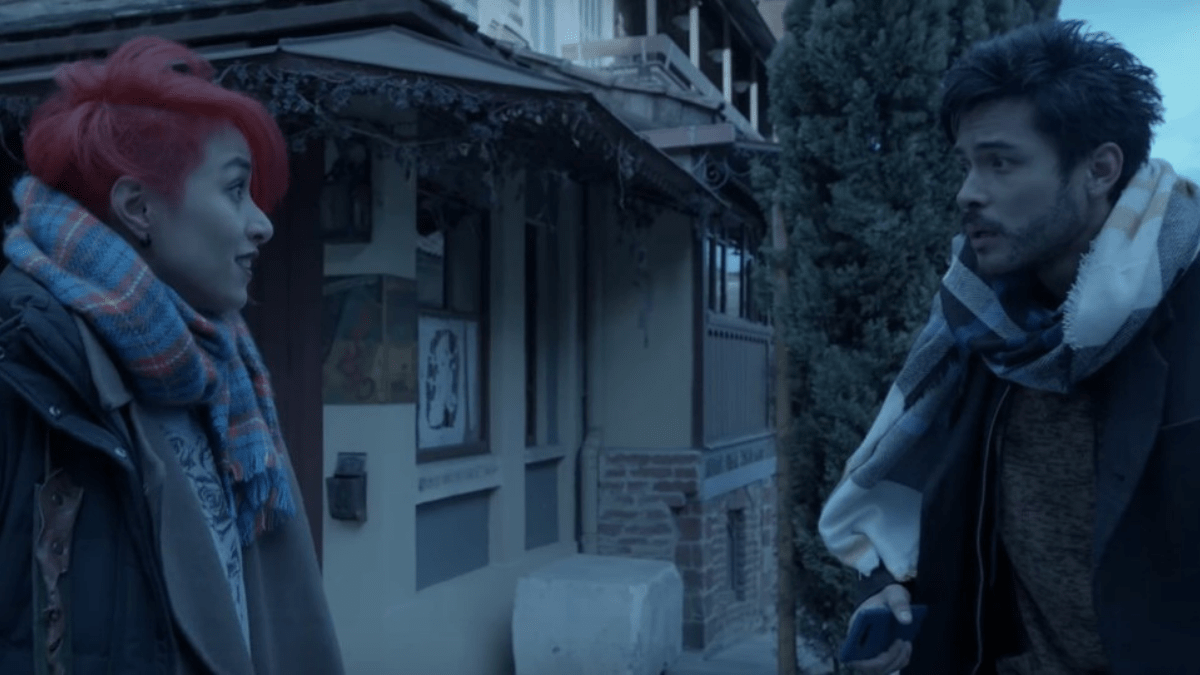 When Joachim and Mara saw Kartlis Deda at Tbilisi, he explained that the monument holds a bowl of grapes on her left to greet those who come to her as friends and a sword on her right for those who come as enemies. Prompting him to ask her a question afterward, will she welcome him with grapes or swords?
When Joachim and Mara saw Kartlis Deda at Tbilisi, he explained that the monument holds a bowl of grapes on her left to greet those who come to her as friends and a sword on her right for those who come as enemies. Prompting him to ask her a question afterward, will she welcome him with grapes or swords?
UnTrue is a he said-she said film meaning to answer this friend or foe question by telling two different versions of the story. As it progresses lies and secrets are uncovered leading to an unexpected finale.
UnTrue starts with a beat-up face of Mara, a waitress, as she recounts the abusive tendencies of her husband Joachim, a businessman. She claims that her husband is a lunatic but she loves him otherwise and longed to be with him despite his instability. However, about halfway through the film, Joachim appeared with a black eye in front of a psychiatrist to tell his side of the story. A story that is very different from Mara's version.
Written and directed by Sigrid Andrea P. Bernardo, known for her films such as the bittersweet romantic film Mr. & Mrs. Cruz (2018) and the odd but beloved romantic comedy film Kita Kita (2017), UnTrue stars Xian Lim as the enigmatic, Joachim and Cristine Reyes as the submissive, Mara.
Set in Georgia, Bernardo makes it a point to incorporate the culture of the place to add substance to her narrative. Other than the iconic Kartlis Deda, she introduces us to the Kartuli Dance, a wedding dance that shows the groom dancing in a certain distance away from the bride as a sign of respect. The dance sees the groom's movements restraint and upper body motionless as the bride stare down symbolizing her gentleness. It is said that the dance means the man needs to control his feelings towards the woman but in the film, it gets deeper than that as the visual of literal tethering accompanies this dance sequence.
UnTrue also makes use of the message the Kartuli Dance brings to draw comparison and contrast between Joachim and Mara by framing themselves as the restrained in their version, antagonizing the other.
The story seems like a fight for dominance to who should take control of the story and to who should the audience believe. It tells a lot about the power of misleading stories to break the truth and victimize ourselves to oppress others. It also subtly reflects the dire consequence of gossips and fake news, which is now a problem more pressing today than before.
Abuse plays a significant part in the story as well. The narrative revolves around a story of abuse, both physical and emotional, that is distressing and unnerving. UnTrue, however, told this story of maltreatment in an unorthodox way by not taking a stand to whoever was wrong or right. It's in this film's vagueness that makes this story irresistibly interesting and cogitating.
UnTrue is a film that is not meant to answer questions. Rather, it exists because it has questions that need answers. Are we really listening? Do we really know the person we're with? Are we really capable of forgiveness? These are some of the queries that the film will leave you with, letting you come up with an answer to satisfy yourself.

